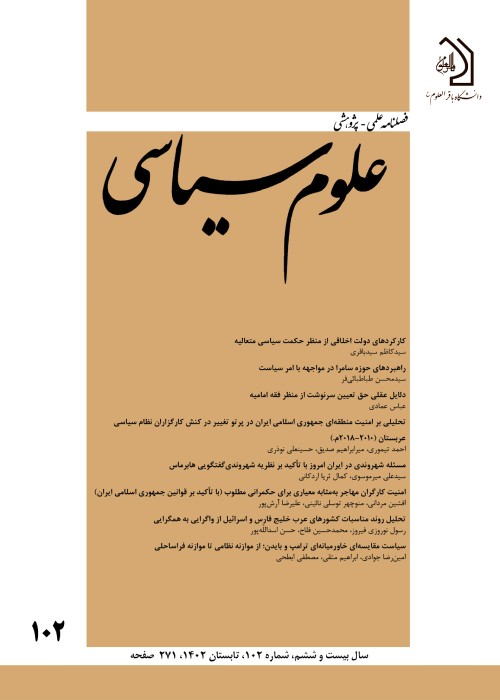Identity foundations of the US foreign policy toward the Islamic Republic of Iran's nuclear file: a constructivist analysis
Author(s):
Abstract:
Emphasizing the role of the identity dimensions and constructs in foreign policy, this article analyzes the identity-based view of the United States to international issues and the constructivist roots of the US foreign policy toward the Islamic Republic of Irans nuclear file. According to the US, after the Islamic revolution, Iran has been basically defined in opposition with the Western values and against liberal democracy and it has characteristics such as trying to acquire weapons of mass destruction, violating the human rights, supporting terrorism and posing a threat against international peace and security. This perception of Iran makes it a challenging and adventurous state, threatening American national security as well as international peace and security. Such a constructed view of Iran is a clear representation of the effects of cognitive patterns and multiple perceptions of self (the United States of America) and the other (the Islamic Republic of Iran) which works as an entering point to the nuclear file. The US has defined and carries on its foreign policy toward the Iranian nuclear issue according to the identity-based approach and a special construct of Iran, within the framework of safeguarding the nuclear non-proliferation regime, hegemony-seeking and unilateralism, threat and militarism based on a number of identity factors, such as Messianism, exceptionalism and enemy-making. To understand the foundations of the US foreign policy it is necessary to analyze the types of its viewpoints and semantic system. Since the positivist methods are unable to do so, interpretive methods could be useful in this respect. As constructivism emphasizes the role of identity and subjective beliefs in defining the interests, policy making and forming the foreign policy conduct, this article makes use of constructivist method.
Keywords:
Language:
Persian
Published:
Political Science, Volume:19 Issue: 3, 2016
Pages:
151 to 171
https://magiran.com/p1665309
دانلود و مطالعه متن این مقاله با یکی از روشهای زیر امکان پذیر است:
اشتراک شخصی
با عضویت و پرداخت آنلاین حق اشتراک یکساله به مبلغ 1,390,000ريال میتوانید 70 عنوان مطلب دانلود کنید!
اشتراک سازمانی
به کتابخانه دانشگاه یا محل کار خود پیشنهاد کنید تا اشتراک سازمانی این پایگاه را برای دسترسی نامحدود همه کاربران به متن مطالب تهیه نمایند!
توجه!
- حق عضویت دریافتی صرف حمایت از نشریات عضو و نگهداری، تکمیل و توسعه مگیران میشود.
- پرداخت حق اشتراک و دانلود مقالات اجازه بازنشر آن در سایر رسانههای چاپی و دیجیتال را به کاربر نمیدهد.
In order to view content subscription is required
Personal subscription
Subscribe magiran.com for 70 € euros via PayPal and download 70 articles during a year.
Organization subscription
Please contact us to subscribe your university or library for unlimited access!


